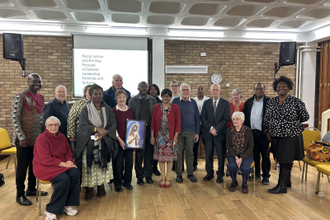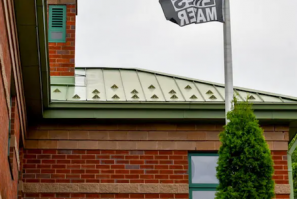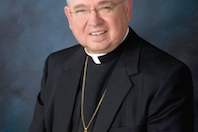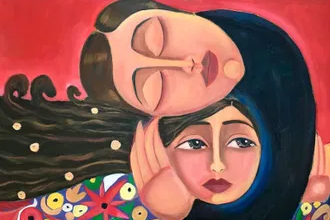African Lives in Northern England Calendar 2021
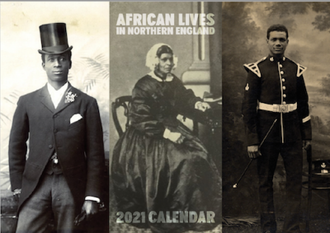
History I wish I had learnt at school!
The past: It's 1979; my mother and I are standing and chatting on the Holy Island harbour beach, watching my two toddler sons dig for shells. A friendly passerby nods and smiles at them, asking me, 'Have you got them for the day?' I explain politely, and she moves on, either puzzled or embarrassed. My sons are linked to the North through me, as much as to Jamaica through their father. None of their links are 'for the day'.
It's 1988 now, and we are on the riverbank in Durham, ' 'neath proud Dunelm's tower'd shrine', where we have just visited the exhibition celebrating St Cuthbert's 13th centenary. The boys are now 10 and 11, and have been promised an outing on the rowing boats. As we wait on the jetty a tourist boat filled with school children in uniform approaches, probably to visit the exhibition. They see my sons, and gleefully start shouting out, 'Look at the Pakis! Pakis go home! Go back to Pakiland!'
For my two boys, this period, punctuated by similar name-calling in other nearby places, marked the end of feeling at home in the North East, despite the welcome and love from my family. They visited rather reluctantly over the next few years. For me that accentuated the alienation and confusion I felt towards my native region. I was born and brought up five miles from Durham; I received my values of tolerance, equality, justice, from family and local schooling. I am proud of my Northern heritage, the mining landscape, my Irish/Northern Catholic family, the Golden Age of Northumbria, the Industrial Revolution, the castles, the music, but not of its racism.
For I had adopted the new Britain, the multiracial society I help to foster, create and support in London. It often seemed that my Northern roots and the 'new world' I now inhabit could not be reconciled. It is a conflict I have carried for over 40 years. My two black British sons have managed their dual heritage, and the racism they still meet, with integrity and dignity. Their father* died in 2019, RIP. I have moved on, the North has moved on. But perhaps not in eternal, painful, parallel.
The present When the Black Lives Matter explosion of protest of 2020 occurred, I began talking to someone from the Catholic Association for Racial Justice from Newcastle during an online seminar. Involved in equality and anti-racist work in the North East, she said cautiously that some things had improved in the region, and pointed me towards recent research about the black presence in the North.
My idea of a 'black lives in the North' calendar fell on rich ground. I was lucky to be pulled in to a circle of like-minded people, historians, writers, educators and activists such as Sean Creighton, Nigel Todd, John Charlton, with the expertise to make the project work. I knew that my grandfather had been in the army alongside Jimmy Durham, first black member of the Durham Light Infantry, and that my brother Michael with friend Tricia Zipfel had seen the Rev Martin Luther King at Newcastle University, and that my sister Madeleine and brother-in-law Brian had lived in a house where abolitionist Frederick Douglass had stayed. The experts revealed so much more.
Extensive research, including David Olusoga's BBC TV series, Black and British, has disclosed fascinating historical evidence that Northern lives have not always been white lives. Archaeological research in South Shields and Burgh by Sands (Cumbria) indicate the presence of Africans amongst the Roman military settlements along the Roman Wall. Local archives and newspapers reveal surprising results. Throughout the 18th and 19th centuries there was a significant black presence, well-documented by the Newcastle Evening Chronicle. Famous black people have visited the North: Muhammed Ali, Frederick Douglass, Paul Robeson... Today there are far more people of colour in the North than 40 years ago. The history continues to be written: this calendar is a small contribution.
*Rothwell Kentish, one of the 'Mangrove Nine'
For a copy(£5 each which includes postage up to 4 copies) please email the form below to barbarakentish@talktalk.net and pay by cheque (made out to Barbara Kentish) or bank transfer. I will send bank details by return.
Name …………………………………………………
Address ……………………………………………………………………… Postcode ……………
Number of copies required ………..….



